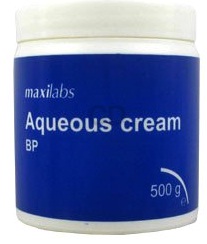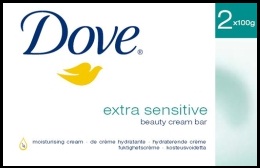Finding suitable skin care products when you have sensitive skin and/or eczema can be hard work. We’ve all been there, that moment seconds after applying when you know you need to wash the offending oitment off quick. Some moisturisers may work fine when your skin is good, but irritate you when your skin flares up, whilst others are just way too harsh. Understanding the list of ingredients in cleansers, moisturisers and skin care products can be very confusing, as most of them sound like unnatural chemicals, and certainly nnot natural and kind to skin. Packaging and marketing can be misleading too – many products will claim to be soothing, reduce wrinkles and nourishing – when in fact they contain worrying things that, if explained, you wouldn’t want to touch with a barge pole.
I took a look at the ingredients on one product on my shelf, Aveeno, which includes: Cetyl Alcohol, Dimethicone, Cera Micorciralline, Distearyldimonium… to name just a few. Aveeno is fragrance free, with a naturally active ingredient – Colloidal oatmeal. It, apparently, moisturises dry skin for 24 hours. This is a kind, gentle skin care product for most people but it irritates my skin. So I wanted to understand what these ingredients are? They don’t sound nice, but rather like nasty diseases of some kind, or dangerous substances… however none of the above listed ingredients in Aveeno are in the list of dangerous ones below. I would like to understand more about what they are, what they do and how they potentially effect my skin. More research needed…
I found this article online, “The 10 worst chemicals in cosmetics and personal care products”. In it the author discusses the effects of prolonged use of skin care products containing far more than ten potentially dangerous ingredients including:
- Emulsifiers
- Lead – which can be found in some lipsticks, sunscreens and tooth whitening toothpastes
- Mercury and formaldehyde
- Copolymer
- Triclosan is found in more than a handful of cosmetics, and now even in toothpaste, because it’s supposed to kill bacteria.
- Urea (Diazolidinyl or Imidazolidinyl) as a preservative
- Phthalates
- Formaldehyde
- Petroleum or petrolatum is commonly found in moisturisers. It forms an oily layer on the skin which blocks moisture evaporation. Just as aluminum in antiperspirants dangerously blocks and traps sweat, petroleum has adverse effects on skin. It is found in most eczema prescription skin emollients and creams, baby creams, makeup and wax depilatory creams.
- Coal tar – which is associated with shampoos and soaps recommended for the use of those with eczema and sensitive skin, causes cancer in lab mice when it’s injected into them.
- Dibutyl phthalate (DBP), the ingredient which provides that shiny, smooth, varnish look, comes at a steep price, and not just in dollars and cents. It’s thankfully banned in Europe
- Diethanolamine and Triethanolamine, more easily recognized as DEA and TEA
- D&C RED 6 is a synthetic dye produced from petroleum or coal tar sources; this dye is FDA-approved for use in pharmaceuticals and cosmetics
- Zinc used in sunscreens and moisturisers, can clog skin pores
- Titanium dioxide is found in concealers and even baby ointments
Your skin is actually the largest organ in your body and it absorbs everything you rub into it. We know, sometimes from painful experimentation, that even products sold for dry skin and eczema can actually be very bad for your skin. Read “Aqueous cream is the worst thing for eczema” to find out the shocking truth.
All this means that those who have eczema, psoriasis or dry skin will probably stick to the rather industrial large tubs of cream and emollient provided on prescription from the NHS e.g. Diprobase and Epaderm to name just a few. Don’t get me wrong, I’m not knocking these products. They are very good, don’t irritate and do the job of moisturising very well, but they’re hardly what you’d call ‘luxurious’. They don’t smell very nice and they don’t have natural ingredients such as lavender, aloe vera, tea tree etc. which we know are very good for treating, healing and nourishing our skin naturally.
Epaderm, which I use regularly, contains liquid paraffin, emulsifying wax BP, cetastereayl, alcohol, sodium lauryl sulphate (SLS) and yellow soft paraffin. Are any of these natural? Would you drink paraffin? Most people would drink alcohol but would you imagine you were rubbing these things regularly into your skin? Sodium lauryl sulphate is also one of those ingredients that some think shouldn’t be put into skin care products. After a little research into this substance I’ve read that it used to be used in garages as a degreaser, which is exactly what it does to your skin. It breaks down the natural oil production of your skin. It can also cause irritation and on some websites it says it’s is potential cancer causing. I’ll be looking into SLS in detail in a future post and asking questions like, what is the long term effect of small doses of SLS on the skin? And why on earth would anyone making products for eczema and sensitive skin choose such an ingredient? What does it bring to the product? How does it help heal or moisturise dry skin? However it doesn’t contain any of the perfumes and nasty preservatives and unnatural things that can irritate skin – and is certainly much better than aqueous cream.
I found a brilliant article by Micki Rose on the Skins Matter website, “Thinny Skinnies – the low down on leaky skin and allergies“ which explains how the skin works and gives a detailed insight into how we should look after our skin.
Take a look at the products you use regularly on your skin and make sure you’re happy about the ingredients. This subject fascinates me so I’ll be doing more research and sharing some of my favourite skin care products and looking into what natural things are good for your skin shortly. What’s your favourite skin care product? and what’s your least favourite, that you’d warn others with sensitive skin not to use?
Photo by Alexandra Tran on Unsplash











I’m regularly putting creams on my skin to combat eczema but not even prescribed medications calm it down properly – e45, steroid creams and hydrocortisone included. Would be interested to find out if anyone has a recommendation for a natural remedy to help dry skin and related problems. Someone once told me a sun bed was the best thing for eczema but the other risks put me off!
Hi Jo. I have tried sun beds and it did work, but I too was worried about long term use. I only tried for a few months (this was just before I got married and I didn’t want that tshirt effect under my lovely strappy wedding dress). I think getting a dose of natural sunlight is probably safer. 20 mins without sun screen means your skin gets lots of vitamin D. By smothering on sunscreens all the time we block the natural vitamin D from getting to our skin, as well as the harmful rays. Caroline’s advice below is good, and as well as benefitting from oral supplements such as aloe, people with dry skin and eczema can often be difficient in some nutrients e.g vitamin E and zinc. Do you take any omega 3/4 oils? I alternate between evening primrose, fish oils and borage oil and I find this does help my skin to maintain moisture. What you eat is also just as important – if you’re continually eating something which your body struggles with it may be effecting your skin – sort that out the reactions should get better. Have you ever been tested by your doctor for food allergies?
PS – Jo – how do you get your face to come up on comments? Is that a setting in wordpress?
Hi Jo,
Have you ever tried working from the inside out ? We have a range of natural products that can help with a number of skin issues including eczema. I would suggested drinking our Aloe Vera Gel and using our Aloe Propolis Creme; all the products come with a 60 day money back guarantee.
You can email me directly at caroline@naturalsuccess.co.uk or call on 07764 290744
Kind regards
Caroline
Too true Caroline – If the skin on the outside is struggling, chances are the insides are struggling too. Keep me posted re aloe gel – am tempted… perhaps once big building bills stop I might give that a go.
Hi Ruth, I have a skin complaint between my fingers. Most of the time it underr control from using aloe v. gell. It does not quite get rid of the problem. But the irritation is manly dealt with.
Have you tried tea tree oil? I put a few drops in my bath water and it really helps clear up stubborn bits that get infected. I’m looking into vinegar and honey too as natural healers. Turmeric could also be useful. We can chat when I visit. I’ll bring some tea tree oil so you can have a soak and see if it helps. You don’t need much as it’s quite strong. Also, worth considering, it could be an allergy to something your hands are coming into contact with… worth thinking about. It is a recent rash? have you changed soap or washing up liquid? Try using marigolds for a bit to see if that helps. Unless you’re allergic to those too!